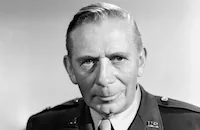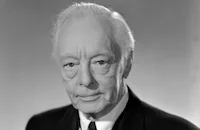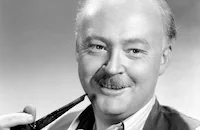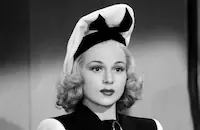The Bachelor and the Bobby Soxer

Brief Synopsis
Cast & Crew
Irving Reis
Cary Grant
Myrna Loy
Shirley Temple
Rudy Vallee
Ray Collins
Film Details
Technical Specs

Synopsis
After Margaret Turner, an attractive, single judge, hears a case involving Dickie Nugent, a playboy artist on trial with three acquaintances for brawling in a Los Angeles nightclub, she issues a warning and dismisses the defendants. Later that day, Dickie delivers a lecture on art at a local high school, and Margaret's teenage sister and ward Susan, who is in attendance, becomes infatuated with him. Inspired by a vision she has of Dickie as a knight in shining armor, Susan insists on interviewing him for the school paper. To satisfy Susan's over-eager curiosity, Dickie invents a lurid past for himself and agrees offhandedly to use her as a model for one of his "Americana" paintings. That night, Susan reveals her infatuation to a disapproving Margaret and, after sneaking away from home, wangles her way into Dickie's empty apartment. Susan falls asleep while waiting for Dickie, causing Margaret and her boyfriend, Assistant District Attorney Tommy Chamberlain, to panic with worry. Just as Margaret deduces where Susan has gone, Dickie returns home and finds the teenager half-asleep on his couch. Margaret and Tommy burst in on the couple, and by the next morning, Dickie is in jail, having been arrested for, among other things, slugging Tommy. While in his cell, Dickie is visited by court psychiatrist Dr. Matt Beemish, who is also Margaret and Susan's uncle. Sensing Dickie's innocence, Matt convinces Margaret, Tommy and the judge who is hearing Dickie's case to drop all charges on condition that Dickie agree to "date" Susan as a way of curing her of her infatuation. As mandated, Dickie escorts Susan to a high school basketball game, where her boyfriend, player Jerry White, becomes distracted with jealousy. Although Dickie tries to push Jerry back into Susan's arms by inviting them for a post-game soda, Jerry declares that he is resigned to losing Susan and offers to be her friend. After a frustrated Dickie says goodnight to Susan, he attempts a sincere flirtation with the serious-minded Margaret, but is awkwardly rebuffed by her. That weekend, Dickie accompanies Susan, Margaret, Tommy, Matt and Susan's other uncle, Judge Thaddeus Turner, on a neighborhood picnic. At Susan's urging, Dickie participates in several races, but loses them all in humiliating fashion to the smug Tommy. Desperate to prove his manhood, Dickie enters the big obstacle race, and because Jerry and Susan have bribed their teenage friends to perform badly and sabotage other entrants in the competition, Dickie beats Tommy and wins. As Dickie accepts his trophy, the now smitten Margaret envisions him as a knight in shining armor, just as her sister had before, and calls him that night for a date. Though exhausted, Dickie eagerly agrees to meet her at the Tick Tock Club, then to confuse Tommy, who has come to confront him, "confesses" that he is madly in love with Susan. Margaret and Dickie's romantic evening at the Tick Tock is shortlived, however, as Susan, Tommy, Jerry and Joey and Agnes Prescott, two of the co-defendants from Dickie's court appearance, join them at their table. While Susan denounces Margaret for "stealing" Dickie, Jerry becomes angry at Susan for not caring about his recent draft notification. A jealous Tommy then accuses Dickie of immoral conduct, and as the rest of group argues noisily, Agnes screams that Dickie has ruined her birthday. After Susan and Margaret storm home, Matt uses his psychological skills to convince the younger sister that she is not in love with Dickie. Susan apologizes to Margaret, who then is persuaded by Matt to fly away for a short vacation to "forget" Dickie. Unknown to Margaret, however, Matt has spoken to an equally depressed Dickie and knows that he is planning to fly out the next day. At the airport, Matt tricks the police into preventing Tommy from arresting Dickie by telling them that Tommy is a mental patient who believes he is the district attorney, and brings the reluctant lovers together at last.

Director
Irving Reis
Cast

Cary Grant

Myrna Loy

Shirley Temple

Rudy Vallee

Ray Collins

Harry Davenport
Johnny Sands

Don Beddoe
Lillian Randolph

Veda Ann Borg
Dan Tobin
Ransom Sherman
William Bakewell

Irving Bacon
Ian Bernard

Carol Hughes
William Hall

Gregory Gay
Richard Flato
Kay Christopher
Marilyn Mercer
Priscilla Gates
Lydia Ann Mckim
Ann Duncan
Bebe Allen

Charles Halton
Myra Marsh
Charles Marsh
Stephen Wayne
Richard Townsend
Howard Keiser
Bonnie Jean Hartley

J. Farrell Macdonald
Norman Thomson
Mickey Simpson
Jack Gargan
Elena Warren
William Forrest
Carlotta Jelm
Ned Roberts
Pat Flaherty
Harold Hutchinson
Buzz King

William Davidson
Carl Kent
Robert Bray
Garry Owen
Bob Pepper
Dore Schary

Ellen Corby
Crew
James Altwies
C. Bakaleinikoff
John L. Cass
Carroll Clark
Russell A. Cully
Albert S. D'agostino
Bill Dorfman
Robert De Grasse
Leigh Harline
Frederic Knudtson
Nate Levinson
Nicholas Musuraca
Edgar Peterson
Clem Portman
Dore Schary
Sidney Sheldon
Darrell Silvera
Edward Stevenson

Photo Collections
Videos
Movie Clip




Trailer
Hosted Intro




Film Details
Technical Specs

Award Wins
Best Writing, Screenplay
Articles
The Bachelor and the Bobby-Soxer
Newly appointed RKO head Dore Schary, while certainly pleased, remained indifferent to the picture as did the stellar supporting cast comprised of Myrna Loy and Shirley Temple, whose reminiscences of the production were far less amusing than the final results (no doubt a bow to the overall professionalism of the entire company). The problem, believe it or not, was Cary Grant who was a hindrance during most of the shooting.
Grant, who, after two enormous hits, Notorious (1946) and Night and Day (1946), decided it was time to go back to his specialty comedies. MGM pitched him The Hucksters, which he turned down, admonishing the studio for not starring the obvious superior choice - their own house star, Clark Gable. Prior to The Bishop's Wife came the script for The Bachelor and the Bobby-Soxer which Grant accepted to help work off his old RKO contract. While his initial enthusiasm virtually green lighted the project, industry veterans knew that this was not a guarantee. Throughout Grant's career, the perennially moody star would continually agree to then bail out on a diverse number of projects, including Red River (1948), The Land Unknown (1957) and Man's Favorite Sport? (1964).
The Bachelor and the Bobby-Soxer had a number of built in negatives from day one - most prominently Cary's public disapproval of director Irving Reis, campaigning instead for the services of Leo McCarey. Grant further tarnished the proceedings by complaining to Schary that Reis lacked credentials (having just graduated from the 'B' unit), had no understanding of comedy and favored Loy by allowing her "...to get away with murder." This uneasy relationship caused many blow-ups during the shooting, complicated by Schary directing scenes with Grant. At one point, a ticked off Reis got so incensed that he walked off the picture. Grant was also troubled by an FBI investigation involving his close friend Howard Hughes. This did not improve when a week before filming the reclusive millionaire hovered near death after a crack-up in his new prototype XF-11 airplane. To make matters worse, Grant's longtime business partner, Frank Vincent, suffered a fatal heart attack. Needless to say, the picture was not a happy shoot. Fortunately, none of this unpleasantness showed up on the screen; in fact, the movie opened to wonderful reviews, which translated into an almost unprecedented 5.5 million dollars in ticket sales. To say that The Bachelor and the Bobby-Soxer carried RKO over into 1948 is no understatement. Most remarkable (in lieu of the above events) was the on-camera chemistry between Grant and Loy, who immediately were re-teamed for the studio's equally profitable Mr. Blandings Builds His Dream House (1948). When Grant at last received his long overdue honorary Oscar® in 1969, one of the select people he thanked was Sidney Sheldon, proving that in Hollywood time can definitely heal most if not all wounds - especially when said injury pays off at the box office.
Producer: Dore Schary
Director: Irving G. Reis
Screenplay: Sidney Sheldon
Cinematography: Robert de Grasse
Film Editing: Frederic Knudtson
Original Music: Constantin Bakaleinikoff
Principal Cast: Cary Grant (Richard "Dick" Nugent), Myrna Loy (Judge Margaret Turner), Shirley Temple (Susan Turner), Rudy Vallee (Tommy Chamberlain), Ray Collins (Matt Beemish)
BW-96m. Closed captioning. Descriptive Video.
by Mel Neuhaus

The Bachelor and the Bobby-Soxer
Cary Grant: The Signature Collection
Warner Home Video (WHV) is proud to celebrate Cary Grant's centennial with the Signature Collection DVD debut of five films from Hollywood's acclaimed screen legend whose gallantry and courtly charm spanned an illustrious career of 76 films. This collection includes Mr. Blandings Builds His Dream House, The Bachelor and The Bobby-Soxer, My Favorite Wife, Destination Tokyo and Night and Day. Each of the DVDs includes the extra bonus features
. "Grant was indeed Hollywood's quintessential leading man," says George Feltenstein, WHH's Senior Vice President Classic Catalog. "Equally comfortable at comedy or drama, his popularity is unwavering and is still the standard by which romantic, sophisticated leading men are judged."
Once told by an interviewer "Everybody would like to be Cary Grant," Grant is said to have replied: "So would I." Born Archibald Leach in Bristol, England, on January 18, 1904, Grant left school at 14 to join the Bob Pender Troupe of knockabout comedians touring the English provinces. In 1920, Grant first came to America when the troupe appeared on Broadway in Good Times.
In 1933, Mae West picked Grant for She Done Him Wrong and I'm No Angel and his movie career was off and running. In the late '30s, Grant became one of the first stars to work as a "free agent," making films for multiple studios including MGM, Columbia and RKO. In 1936, he first teamed with Katharine Hepburn and director George Cukor for Sylvia Scarlett, the initial film to fully demonstrate Grant's inspired comic flair. Among the films that followed were The Awful Truth, Bringing Up Baby, His Girl Friday, Topper, Philadelphia Story, Suspicion, Arsenic and Old Lace and None but the Lonely Heart, for which he won an Oscar® nomination. In 1970, the actor was given a special Academy Award® for career achievement.
Notably, Grant appeared in four of Alfred Hitchcock's best films, including the romantic thrillers North by Northwes with Eva Marie Saint; Notorious opposite Ingrid Bergman; Suspicion opposite Joan Fontaine and To Catch A Thief with Grace Kelly. Seemingly growing more handsome and charming as he got older, Grant retained his star status into the 1960s, appearing in such box-office hits as Operation Petticoat and Charade. He retired from the screen in 1966, but spent the next twenty years in the public eye, as a board member for companies such as Faberge, MGM and Hollywood Park. Despite constant offers, Grant refused to return to the screen, although he did consent to a series of retrospective Q&A evenings across America with his beloved fans. He enjoyed the experiences immeasurably, as did the audiences. It was in Davenport, Iowa while rehearsing for one of these "in-person" events that Cary Grant suffered a sudden stroke and died on November 29, 1986.
The Films in Cary Grant: The Signature Collection
Mr. Blandings Builds His Dream House - Goodbye city life; hello Connecticut, with plenty of laugh stops along the way. This movie classic - named by AFI as one of America's 100 Funniest Movies - about the frustrations and joys of building and owning a home features Grant as a New York ad exec who's taken on the task of building a house from the ground up. Will he lose everything, including his sanity, or become a happy suburban homeowner? Myrna Loy, as his extremely patient wife and Melvyn Douglas join in the fun.
Mr. Blandings Builds His Dream House will have the following extra content:
· Two Radio Productions:
- October 10, 1949 LUX Radio Theatre Broadcast starring Grant and Irene Dunne
- June 9, 1950 Screen Directors Playhouse Broadcast starring Grant and (his then-wife) Betsy Drake
· "The House of Tomorrow" Classic M-G-M Tex Avery Cartoon
· Cary Grant Trailer Gallery
· Theatrical Trailer
The Bachelor and The Bobby-Soxer - 1947 Academy Award® winner for Best Original Screenplay (by Sidney Sheldon), the film stars Cary Grant with Myrna Loy and a teen-aged Shirley Temple. In this very entertaining romantic comedy, Grant plays Richard Nugent, a bachelor minding his own business who finds a love-sick girl (Shirley Temple) asleep on his couch. The older sister of the teen is a Judge (Myrna Loy), and she "sentences" Nugent to go out with the bobby-soxer until she is no longer infatuated.
The extra features included on the DVD are:
· June 13, 1949 LUX Radio theatre Radio Production starring Grant and Temple
· "Little Tinker" Classic Tex Avery M-G-M cartoon
· Cary Grant Trailer Gallery
· Theatrical Trailer
My Favorite Wife - Grant skillfully plays the romantic hunk and the comedic buffoon in this movie about marital mix-ups. Nick Arden (Grant) is on his way to the honeymoon suite with his new bride (Gail Patrick) when he runs into the wife (Irene Dunne) who was lost at sea and presumed dead seven years ago. The marriage knots have to be untied as the real Mrs. Arden steps up to claim her husband in this quirky romance filled with high jinks and big laughs.
My Favorite Wife will contain the following bonus content:
· Vintage M-G-M Robert Benchley short subject "Home Movies"
· December 7, 1949 Screen Director¿s Playhouse Radio Production starring Grant and Dunne
· Theatrical Trailer
Destination Tokyo - Grant is a military hero in this action-filled war drama. As Captain Cassidy, Grant pilots the U.S. submarine Copperfin through the dangerous waters of the enemy's front yard. Delmer Daves makes his directorial debut with this film that critics say remains "a classic war drama." This is the only military drama Grant made during World War II.
Destination Tokyo will contain these bonus features:
· Warner Bros. WWII short: "Gem of the Ocean"
· Cary Grant Trailer Gallery
· Theatrical Trailer
Night And Day - Appearing in his first Technicolor motion picture, Grant portrays Cole Porter, the legendary, sophisticated songwriter whose life was marked by triumph and tragedy. He's joined by a superb cast including Alexis Smith, Jane Wyman, Eve Arden and Monty Woolley as himself. The film contains more than 20 of Porter's songs which have been enjoyed by many generations over the years. One of the film's most famous moments is Mary Martin re-creating her Broadway performance of "My Heart Belongs to Daddy," the show-stopper that made her an overnight star. Even Cary gets into the act singing "You're the Top" with `40s chanteuse Ginny Simms. Interestingly, Hollywood is once again bringing Porter's life to the screen later this year, with Kevin Kline portraying the composer in Irwin Winkler's film "DeLovely."
The extra content in Night And Day will be:
· Vintage Warner Bros. Shorts: Desi Arnaz and His Orchestra and "Musical Movieland"
· Bugs Bunny and Elmer Fudd in "The Big Snooze" a classic Looney Tunes cartoon
· Cole Porter Trailer Gallery
Each DVD will be presented in a format preserving the aspect ratio of its original theatrical exhibition and will include subtitles in English, French and Spanish. All except The Bachelor and The Bobby-Soxer are in Dual-Layer format.
To order Cary Grant: The Signature Collection, click here. Explore more Cary Grant titles here.
Cary Grant: The Signature Collection
Quotes
Ready boot, let's scoot!- Richard Nugent
Hi! Mellow greetings, yookie dookie!- Richard Nugent
You know I'd die for you, only sometimes it's so hard living with you.- Margaret
You're going to make me an old maid.- Susan
Only until you're 18.- Margaret
I'm the court psychiatrist.- Matt Beemish
Come back in an hour. I'll be crazy by then.- Richard Nugent
Trivia
Notes
The working title of this film was Suddenly It's Spring. In addition to Shirley Temple, RKO borrowed Johnny Sands, producer Dore Schary and writer Sidney Sheldon for the film from David O. Selznick's Vanguard Pictures. The Bachelor and the Bobby-Soxer was Schary's last personal producing assignment before becoming vice-president in charge of production at RKO. According to a Hollywood Reporter news item, art director Carroll Clark scouted locations for the picture in Lake Arrowhead, CA. It is not known, however, if any scenes were actually shot there. Exterior shots of Beverly Hills High School were included in the picture. According to a pre-release Motion Picture Herald article, a representative of the Woman's Christian Temperence Union in Chicago became upset after reading that Temple was to take her first screen drink in the film and asked RKO executives to eliminate the scene. In the viewed film, Temple does not take any alcoholic drink. Sheldon's script won an Academy Award for Best Original Screenplay. Modern sources add the following information about the production: In addition to "Suddenly It's Spring," Sheldon's screen story was also titled "Too Good to Be True." Schary objected to the title The Bachelor and the Bobby-Soxer because he felt it suggested a distasteful sexual relationship, but was overruled by the more commercially minded Selznick. Director Irving Reis collapsed a week after filming had started and was replaced temporarily by Schary. When he returned to the production, Reis concentrated on the technical aspects of the film, while Schary focused on the actors. Modern sources also add that the film earned $5,550,000 at the box office. Cary Grant starred with Shirley Temple in a June 13, 1949 Lux Radio Theatre broadcast of the story. Johnny Sands also reprised his role for the broadcast.

Miscellaneous Notes
Released in United States Summer September 1, 1947
Released in USA on video.
Released in United States Summer September 1, 1947














